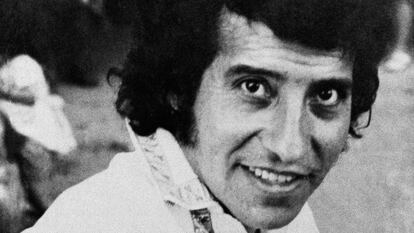Retired Chilean Army brigadier takes own life after conviction for 1973 murder of Víctor Jara
Hernán Chacón Soto, 86, had been sentenced to 15 years in prison for aggravated homicide and 10 years for aggravated kidnapping for the assassinations of the singer and Littré Quiroga

One of the seven former members of the Chilean military convicted of the torture and assassination of singer-songwriter Víctor Jara, retired brigadier Hernán Chacón Soto, took his own life after the verdict was returned by the Supreme Court, as confirmed to this newspaper by the Ministry of the Interior. Soto, 86, was found dead by the Investigations Police (PDI), as reported by Radio ADN, who arrived at his home to transfer him to prison to serve his sentence: 15 years for aggravated homicide and 10 years for aggravated kidnapping for his part in the murders of Jara and Littré Quiroga, who oversaw the prison system during the socialist government of Salvador Allende. The killings took place a few days after the coup d’état of September 11, 1973.
According to local media, the PDI arrived at Chacón’s home in the municipality of Las Condes, in the eastern part of Santiago, to notify him of the ruling, when he reportedly asked for permission to go to his bedroom to retrieve some medicines. At that point, he shot himself.
According to his defense testimony, in his rank of major at the time of the coup, he was only tasked with guarding the perimeter of the Estadio Chile, where the crimes took place. However, the court said such an assignment was not consistent with his rank, nor with the testimonies and evidence gathered.
According to the 2021 ruling of the Court of Appeals, which was ratified Monday by the Supreme Court, Chacón had tactical and intelligence knowledge, “conditions that allowed him to intervene directly in the interrogations” that were carried out in the locker rooms of the Estadio Chile, where Jara and Quiroga were imprisoned along with thousands of Allende supporters, “as well as in the previous process of classification of the detainees” — deciding who was to be interrogated.
The investigation adds that “several testimonies corroborated that he participated in the selection process and reported these to his superiors, so his statements that he was guarding the perimeter were neither credible nor plausible.” It was also noted that according to witnesses Chacón “was carrying a 9-millimeter STYER pistol at the time, a weapon that fully coincides with the technical description of the injuries that, according to forensic records, caused the deaths of Víctor Jara and Littré Quiroga.”
The seven former soldiers convicted of the murders of Jara and Quiroga, now aged between 73 and 86, went on to attain senior ranks within the Chilean Army, ranging from colonels to brigadiers.
On January 17, 2005, retired colonel Germán Barriga, who was part of the National Intelligence Directorate (DINA), the secret police operating during the dictatorship of Augusto Pinochet (1973-1990), took his own life while on trial for the so-called Conference Street Case, referring to the kidnapping and imprisonment of the Communist Party of Chile leadership in 1976.
On September 28, 2013, retired general and former director of the National Information Center (CNI), the agency that replaced the DINA, Odlanier Mena, took his own life at his home in Las Condes during a weekend furlough from prison, having discovered that he was going to be transferred from the Cordillera prison, where dozens of ex-military personnel were held, to the Punta Peuco Prison, a special facility for prisoners convicted of crimes against humanity and human rights abuses committed during the dictatorship.
In 2015, retired general Hernán Ramírez Rurange killed himself at 76 shortly before he was due to serve his sentence in Punta Peuco for the murder of former DINA biochemist Eugenio Berríos, whose remains were discovered in Montevideo in 1995. Berríos had worked for Pinochet’s security services developing sarin gas to be used against opponents of the regime.
Ramírez Rurange, who had been Pinochet’s aide-de-camp in the 1980s, was head of the Army Intelligence Directorate. The justice system established that this organization was behind Berríos death and Ramírez Rurange was also summoned to testify in 1991 for the car bomb assassination of Allende’s former foreign minister Orlando Letelier in Washington in 1976, which was attributed to the DINA.
Sign up for our weekly newsletter to get more English-language news coverage from EL PAÍS USA Edition
Tu suscripción se está usando en otro dispositivo
¿Quieres añadir otro usuario a tu suscripción?
Si continúas leyendo en este dispositivo, no se podrá leer en el otro.
FlechaTu suscripción se está usando en otro dispositivo y solo puedes acceder a EL PAÍS desde un dispositivo a la vez.
Si quieres compartir tu cuenta, cambia tu suscripción a la modalidad Premium, así podrás añadir otro usuario. Cada uno accederá con su propia cuenta de email, lo que os permitirá personalizar vuestra experiencia en EL PAÍS.
¿Tienes una suscripción de empresa? Accede aquí para contratar más cuentas.
En el caso de no saber quién está usando tu cuenta, te recomendamos cambiar tu contraseña aquí.
Si decides continuar compartiendo tu cuenta, este mensaje se mostrará en tu dispositivo y en el de la otra persona que está usando tu cuenta de forma indefinida, afectando a tu experiencia de lectura. Puedes consultar aquí los términos y condiciones de la suscripción digital.









































